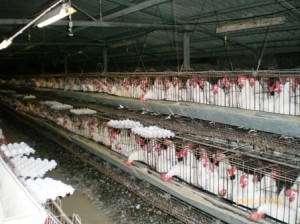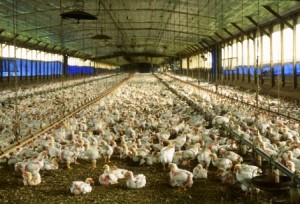The "Organic" Label Does Not Always Mean Humane
A new study released by The Cornucopia Institute, an advocate for family farming, found that most of the common organic and cage-free eggs we purchase at our grocery stores are from chickens that are produced in an industrial-scale setting where no outdoor access is granted for the chickens and most birds are packed into sheds by the thousands. That isn’t the image we had about organic now is it?
The news was stunning because as an animal advocate and organic consumer, I thought I was making a good choice by selecting brands with organic or cage-free on the label. I assumed, as I am sure many consumers do that “organic” meant the birds were humanely treated, not caged, and allowed to roam free as happy chickens.
It was worth it to me to be paying the extra money for that piece of mind that the animals were receiving humane treatment. However, the report by The Cornucopia Institute showed that organic and cage-free does not mean that the chickens who lay the eggs are roaming free.
“Organic eggs” means that the chickens just eat organic feed, and “cage-free eggs “means the chickens are not kept in cages, however, they are still packed together in dirty, airless, close quarters. Even outdoors doesn’t mean they are allowed to roam in the open air. It just means that the egg producer provides a small opening to access an outdoor area, usually a concrete patio.
The Cornucopia Institute released an egg scorecard giving egg producers five eggs for the best conditions and “exemplary-beyond organic,” and one egg for producers with the worst conditions or “ethically deficient-industrial organics, no meaningful outdoor access.”
Some “five egg” earners are (the best rated):
- Coon Creek Farms
- Kingbird Farms
- Krause Farms
- Neversink Farms
- Organic Pastures
- Cleary Family Farm
- Common Good Farm
- Highfields Farm
- Misty Meadow Farm
- Old Friends Farm
- One Drop Farm
- River Berry Farm
- Trout Lake Abbey
These producers are “found locally or regionally under their farm’s brand name, and mostly through food co-ops, farmer markets and independently owned grocery stores and sometimes larger chains like Whole Foods,” reports The Cornucopia Institute.
Among the worst were:
- 4-Grain
- Born Free
- Chino Valley Ranchers
- Egg Innovations
- Eggland’s Best
- Garden Valley
- Horizon Organic
- Land O’Lakes
- Nest Fresh Eggs
- Oakdell
Well-known private brands with one egg rating were Whole Foods, Wal-Mart, Costco, Safeway and Trader Joe’s.
The complete scorecard can be found at Cornucopia Institute website.
“Organic should mean that it contains 95 percent organic ingredients and a government-approved expert has inspected the farm where it was produced to make sure the farmer follows the USDA requirement for organic,” according to the U.S. Department of Agriculture. However, these standards don’t account for how the animals are treated so it is best to support farmers who treat their animals humanely. Organic production should mean production that is kinder to animals and to the environment.
Share This




